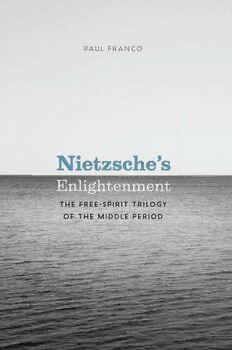
Nietzsche's Enlightenment: The Free-Spirit Trilogy of the Middle Period PDF
Preview Nietzsche's Enlightenment: The Free-Spirit Trilogy of the Middle Period
Nietzsche’s Enlightenment Nietzsche’s Enlightenment The Free-Spirit Trilogy of the Middle Period PAUL FRANCO The University of Chicago Press Chicago and London Paul Franco is professor of government at Bowdoin College and the author of Michael Oakeshott: An Introduction, Hegel’s Philosophy of Freedom, and The Political Philosophy of Michael Oakeshott. The University of Chicago Press, Chicago 60637 The University of Chicago Press, Ltd., London © 2011 by Paul Franco All rights reserved. Published 2011. Printed in the United States of America 20 19 18 17 16 15 14 13 12 11 1 2 3 4 5 ISBN-13: 978–0-226–25981–9 (cloth) ISBN-10: 0–226–25981–1 (cloth) Library of Congress Cataloging-in-Publication Data Franco, Paul, 1956– Nietzsche’s enlightenment : the free-spirit trilogy of the middle period / Paul Franco. p. cm. Includes bibliographical references and index. ISBN-13: 978-0-226-25981-9 (hardcover : alk. paper) ISBN-10: 0-226-25981-1 (hardcover : alk. paper) 1. Nietzsche, Friedrich Wilhelm, 1844–1900. 2. Nietzsche, Friedrich Wilhelm, 1844–1900. Menschliches, allzumenschliches. 3. Nietzsche, Friedrich Wilhelm, 1844– 1900. Morgenröthe. 4. Nietzsche, Friedrich Wilhelm, 1844–1990. Fröhliche Wissenschaft. 5. Ethics. 6. Philosophy. I. Title. B3317.F69 2011 193—dc22 2010049973 a This paper meets the requirements of ANSI/NISO Z39.48-1992 (Permanence of Paper). For Joe CONTENTS Preface / ix List of Abbreviations / xvii PROLOGUE / Birth of a Free Spirit / 1 ONE / Human, All too Human and the Problem of Culture / 13 TWO / Daybreak and the Campaign against Morality / 57 THREE / The Gay Science and the Incorporation of Knowledge / 101 FOUR / The Later Works: Beyond the Free Spirit / 161 EPILOGUE / 225 Notes / 229 Index / 257 PREFACE On the back cover of the 1882 edition of The Gay Science, Nietzsche wrote: “This book marks the conclusion of a series of writings by FRIEDRICH NIETZSCHE whose common goal is to erect a new image and ideal of the free spirit.” He then went on to list the three books that belong to this series: Human, All too Human (along with its two supplements, Mixed Opinions and Aphorisms and The Wanderer and His Shadow), Daybreak: Thoughts on the Prejudices of Morality, and The Gay Science. This comment clearly indicates that Nietzsche thought of these books as belonging together and as being unified by a common theme; it perhaps even justifies my referring to them as a “trilogy.” At any rate, it is these three books from Nietzsche’s so-called middle period that I subject to careful examination in this study. Why study Nietzsche’s middle works, which are so much less well known than the great works of Nietzsche’s maturity—Zarathustra, Beyond Good and Evil, and the Genealogy of Morals—and even to some extent his earlier works—The Birth of Tragedy and Untimely Meditations? I suppose the obvious reason is precisely that they are less well known, especially Human, All too Human and Daybreak. This is not to say that references to various aphorisms in these works do not abound in the secondary literature; but there has been relatively little systematic study of these works apart from how they either anticipate or do not anticipate Nietzsche’s later doctrines. A signal exception to this general pattern is Ruth Abbey’s pioneering study, Nietzsche’s Middle Period, which traces a number of individual themes—morality, psychology, vanity, pity, women, and the relations between the sexes—throughout the middle works.1 Also noteworthy are various scholarly efforts to examine these works for what they have to say about the influence of other writ- ers on Nietzsche—for example, the French moralists, certain neo-Kantian
